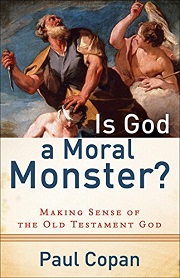 “Is God a moral monster?” This is the question apologist Paul Copan seeks to answer in response to the harsh criticism from New Atheists about the monstrous God found in the Old Testament
“Is God a moral monster?” This is the question apologist Paul Copan seeks to answer in response to the harsh criticism from New Atheists about the monstrous God found in the Old Testament
In part one of the book, Paul Copan spends two chapters summarizing the angry but flimsy arguments of the New Atheists, and lists their typical complaints against the Old Testament God. They often raise questions about the strange and harsh Old Testament laws, slavery, ethnic cleansings and the killing of the Canaanites, just to name a few. Regarding recent trends in American society Copan also compares some statistics from 1944 and 2007 which show a similar percentage of atheists in America (4%). Though the stats are currently outdated, he wisely quips, “Rumors of God’s death have been greatly exaggerated” (16).
In part two, Copan spends three chapters answering accusations against God’s character. There are a host of accusations, such as those claiming that he is a prideful, jealous and a bully. Copan also includes a whole chapter on the sacrifice of Isaac.
In part three, Copan spends thirteen chapters examining the seemingly amoral laws God established for Israel. He gives a rationale for Israel’s “weird” kosher and cleanliness laws, answers charges that Israel’s civil laws were barbaric and misogynistic, clarifies what slavery was like in both the Old and New Testament world, and examines whether Israel’s conquest of Canaan is an example of ethnic cleansing. As a concrete example from this section, Copan discussed the intricate Israelite law code in these terms: “So Israel’s land, Israel’s sacrifices, and Israel’s food all had social and theological significance. Israel’s various boundaries were to remind her of her relationship to God and to the nations around her. Just as God was set apart from human beings, Israel was to be set apart in its behavior and theology from the surrounding nations” (78).
In part four, Copan closes his book by answering the New Atheists’ claim that God is not needed for morality, and lists the many blessings that Judeo-Christian monotheism has brought to civilization.
What I especially appreciated is how Copan took the New Atheists to task for their poor arguments with the same biting sarcasm they often dish out. He wrote that their arguments “resemble the simplistic village atheist far more than the credentialed academician” (17). He also quoted atheist Michael Ruse who said Richard Dawkins arguments are so bad that he’s embarrassed to call himself an atheist (17).
Secondly, throughout the book, Copan repeated a number of basic arguments that answer many of the New Atheist’s accusations. The laws given to Moses were not meant to be a universal ideal. They were meant only for Israel and only for a time. Many of the civil punishments were “case laws,” describing what to do if a crime was committed. Again and again he gave examples of how the Mosaic laws were a dramatic improvement from other Ancient Near Eastern civilizations, and actually protected women, rather than suppressed them.
Finally, Copan made a compelling case that the conquest of Canaan wasn’t nearly as barbaric as we think. He gives both Biblical and archeological evidence that the Canaanites were intentionally driven out, not annihilated, and that cities like Jericho that were destroyed were likely military garrisons, where mostly enemy soldiers, and not civilian populations, were killed.
I didn’t agree with all of Copan’s arguments and you probably won’t either. He suggested that God made Israel’s laws more stringent after the golden calf incident and that he later gave them another moral upgrade in Deuteronomy. His reasons for why there were no female priests were suspect and he left out the chief reason, God’s order of creation. We would also disagree with his assertion that any Canaanite infants and children who were killed, being innocent, “would have entered the presence of God” (189).
Lutherans simply take God at his Word, regardless of whether we always understand or can defend every single action of God. Yet, this book would still be a worthy addition to a pastor’s library. It deals extensively with many difficult Old Testament passages and so makes for a handy pastoral reference tool. There are study questions on each chapter at the end of the book that could be used for a Bible study. The book itself was written with the lay reader in mind, so a member troubled by Old Testament “barbarism” would find the book both understandable and helpful. This book also gives a great apologetic defense of Old Testament ethics, an area often ignored when wrestling with these difficult passages. C.S. Lewis warned about a “chronological snobbery,” meaning the “uncritical acceptance of the intellectual climate common to our age and the assumption that whatever has gone out of date is on that account discredited” (58). God willing, we won’t uncritically accept the climate of our day, but we are tempted to dismiss the past as obsolete. It can be difficult at times to truly understand a world so different from our own, such as the Old Testament. This book can help a Lutheran pastor to avoid that aspect of “chronological snobbery” and to consider again some of the tough questions people are raising in our world.
Paul Copan (PhD, Marquette University) is the chair of philosophy and ethics at Palm Beach Atlantic University in Florida. He is the author and editor of over twenty apologetic and philosophy books.

